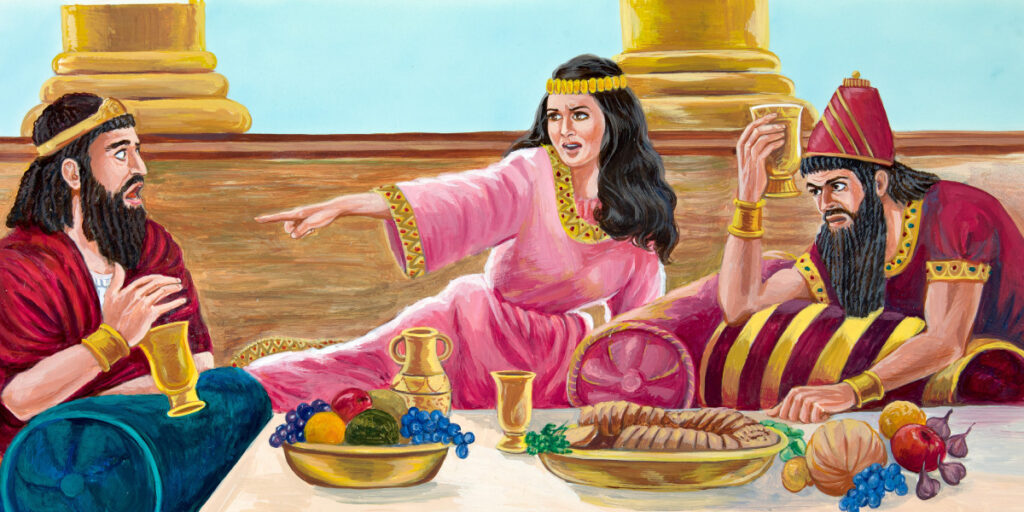To accompany your Come Follow Me study for July 25-31
In addition to reading these prescribed chapters, you may enjoy:
- The corresponding material from the Institute student manual found in the online Gospel Library.
- The video Come Follow Me 2022 LDS (July 25-31) Esther | Esther Saves the Day at https://www.youtube.com/watch?v=Tzm4iuTSU2E
- The video For Such a Time as This at https://www.youtube.com/watch?v=Oo1A3sOvHyo
- The video Bible Collection: Esther (2000) at https://www.youtube.com/watch?v=ccTHkycbYXo
If you would enjoy seeing a Kahoot game related to this material which you could use for your own amusement or with your family or class, click here: https://create.kahoot.it/share/the-book-of-esther/a327618c-7ea0-46fa-a57f-1ff8f8e4aa17. (To use it with a group, after clicking on this link, you will need to log into Kahoot, creating a free account if you have not done so previously, then click on the blue “Start” button.)
Points to Ponder in Esther
1. The book of Esther, like the Song of Solomon, almost didn’t make it into the Bible. Martin Luther, the great reformer, said, “I am so hostile to the book and to Esther that I wish they did not exist at all.” Why on earth would Esther have been so controversial and why would Luther have been so opposed to the book’s inclusion in the Bible?

2. What can you say in defense of not only including the book of Esther in the Bible but spending an entire week on it in the Come Follow Me program, when so many other great chapters from previous books were passed over in silence?
3. Why was Queen Vashti’s refusal to come when the king called her considered such a serious offence? To what extent did the Persian law governing family relationships reflect the divine law?
4. What are the main points of the book of Esther, so far as its modern day application is concerned?

5. What change was made in the heading to chapter 8, and why? (The second sentence in the heading once read differently in the Latter-day Saint edition. What do we learn from this about how we are to consider the chapter headings?)
6. Can you think of other problems which have come from “irrevocable decrees”? What lesson is there for us in this?
Possible Answers to Points to Ponder in Esther
1. The book of Esther, like the Song of Solomon, almost didn’t make it into the Bible. Martin Luther, the great reformer, said, “I am so hostile to the book and to Esther that I wish they did not exist at all.” Why on earth would Esther have been so controversial and why would Luther have been so opposed to the book’s inclusion in the Bible?
Reasons seem to have included:
- There is not a single mention of the name of God, the Lord, heaven, angels, or any other divine being in the entire book.
- The book seems to criticize queen Vashti’s standing up for her rights and refusing to put her physical beauty on display before the king’s drunken associates, while it honors Esther, who seems to have had no similar reservations and at best was just one member of the king’s harem.
- The Jewish feast of Purim, which celebrates the Jewish victory over their enemies as recorded in the book of Esther, is one of the most unreligious of Jewish festivals, highlighted by drunkenness and reveling more akin to Mardi Gras than to a religious celebration.
- It has been argued that Esther is no perfect paragon of virtue in the book, being guilty of deceit (2:10), initial cowardice (4:11), and complicity in misrepresenting Haman’s intentions (7:8).
- It is argued that there is too much happiness in the Jewish slaughter of their enemies at the end of the book.
2. What can you say in defense of not only including the book of Esther in the Bible but spending an entire week on it in the Come Follow Me program, when so many other great chapters from previous books were passed over in silence?
- Though God is not specifically mentioned, His intervention is certainly implied in what otherwise would have been simply a series of unlikely coincidences that brought an orphan Jewish girl to become queen of Persia at just the right time to prevent the slaughter of her people, that would have had Mordecai just happen to overhear and be able to report a plot against the king, etc. It is hard to imagine that Esther’s fasting prior to going to see the king was not accompanied by fervent prayer. In fact, the historian Josephus assures us that Esther did indeed pray on this occasion, after the manner of her people.
- The theme of foreordination is so strong, and it is so important that each of us consider to what we may have each been foreordained and that we look for God’s hand in the seemingly small details of our lives.
- Esther demonstrates that one righteous person can make a big difference in a wicked world, even against overwhelming odds.
- Esther teaches us that some things are worth dying for, if necessary.
- It would be difficult to omit any of the chapters of the book of Esther without seriously detracting from the story.
- One can hardly fault Esther for initially concealing her ethnicity nor for having some reservations about going in uninvited to see the king, since the potential penalty for doing so was death. Nor is there any reason to feel sorry for Haman’s being apprehended unjustly for attempted rape when he was guilty of even worse crimes.
- The Jewish joy at their preservation from their enemies is quite understandable, and the Old Testament is full of instances of the destruction of the wicked with divine approval.
- It has been pointed out that Esther can be considered a type of Jesus Christ, intervening as she did on behalf of her people, just as Haman is a type and shadow of Satan himself.
- Joseph Smith did not declare the book of Esther to be uninspired, as he did the Song of Solomon, when making his inspired revision of the scriptures.
3. Why was Queen Vashti’s refusal to come when the king called her considered such a serious offence? To what extent did the Persian law governing family relationships reflect the divine law?
In that culture, all wives were expected to obey their husbands. If the queen didn’t obey the king, it would set a terrible precedent for other wives who would feel they could similarly disregard their husbands’ requests. This is definitely not the divine law but that of a corrupt human society! God never intended that women be subservient to men but that they work together as equal partners, with the usually physically stronger man taking the lead to see that his wife’s and family’s needs were met.
4. What are the main points of the book of Esther, so far as its modern day application is concerned?
This is essentially another way of rephrasing question #2, but it’s worth repeating. Lessons include:
- We are foreordained to specific roles in God’s work on earth, which we can discover through prayer, patriarchal blessings, and the passage of time if we live rightly.
- God is involved in the details of our lives, and someday we’ll see that many of the little “coincidences” that blessed our lives were really cases of divine intervention.
- Fasting and prayer are necessary to accomplish our divine mission
- Evil returns to those plotting it.
5. What change was made in the heading to chapter 8, and why? (The second sentence in the heading once read differently in the Latter-day Saint edition. What do we learn from this about how we are to consider the chapter headings?)
The heading once read, “Ahasuerus reverses the decree calling for the destruction of the Jews.” But that wasn’t technically true, as Persian laws at that time were considered irrevocable. So the heading was properly changed to its present form, as what the king did was to issue a second decree allowing and encouraging the Jews to defend themselves, which they did with great success. We are grateful for the wonderful chapter headings produced by Elder Bruce R. McConkie for each chapter in the standard works. But we make no claim to their infallibility, and more than one has been changed through the years to better reflect what the scriptures themselves actually said.
6. Can you think of other problems which have come from “irrevocable decrees”? What lesson is there for us in this?
- Jephthah (Judges 11) promises to offer as a burnt offering the first thing to come out of his house when he returns home—and it turns out to be his daughter. (Some commentators believe Jephthah consecrated his daughter to perpetual virginity as a servant of the Lord rather than offer her as a burnt offering, but it is still clear that he regretted his vow.)
- The Persian king, though he loved Daniel, was bound to throw him into a lions’ den after agreeing to do so to anyone who worshipped any god other than himself.
- Missionaries constantly meet people who say they cannot be baptized into our Church because they promised their parents or grandparents or someone else that they would never change religions.
It is clear that we need to be very careful not to make any vow that we are not prepared to keep under all circumstances. It seems equally clear that if we made a foolish promise in the past, it could be better to break it than to keep it.
